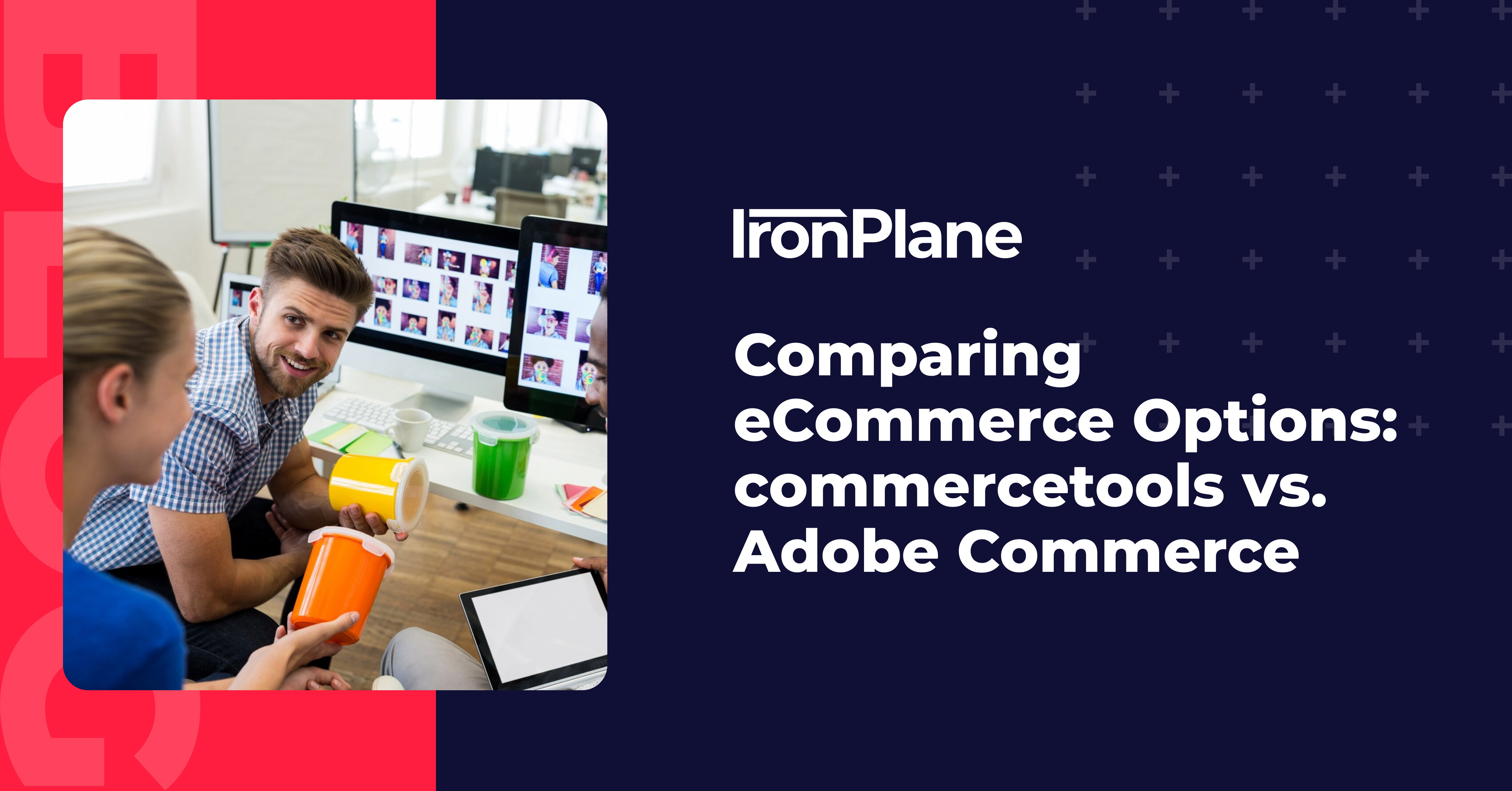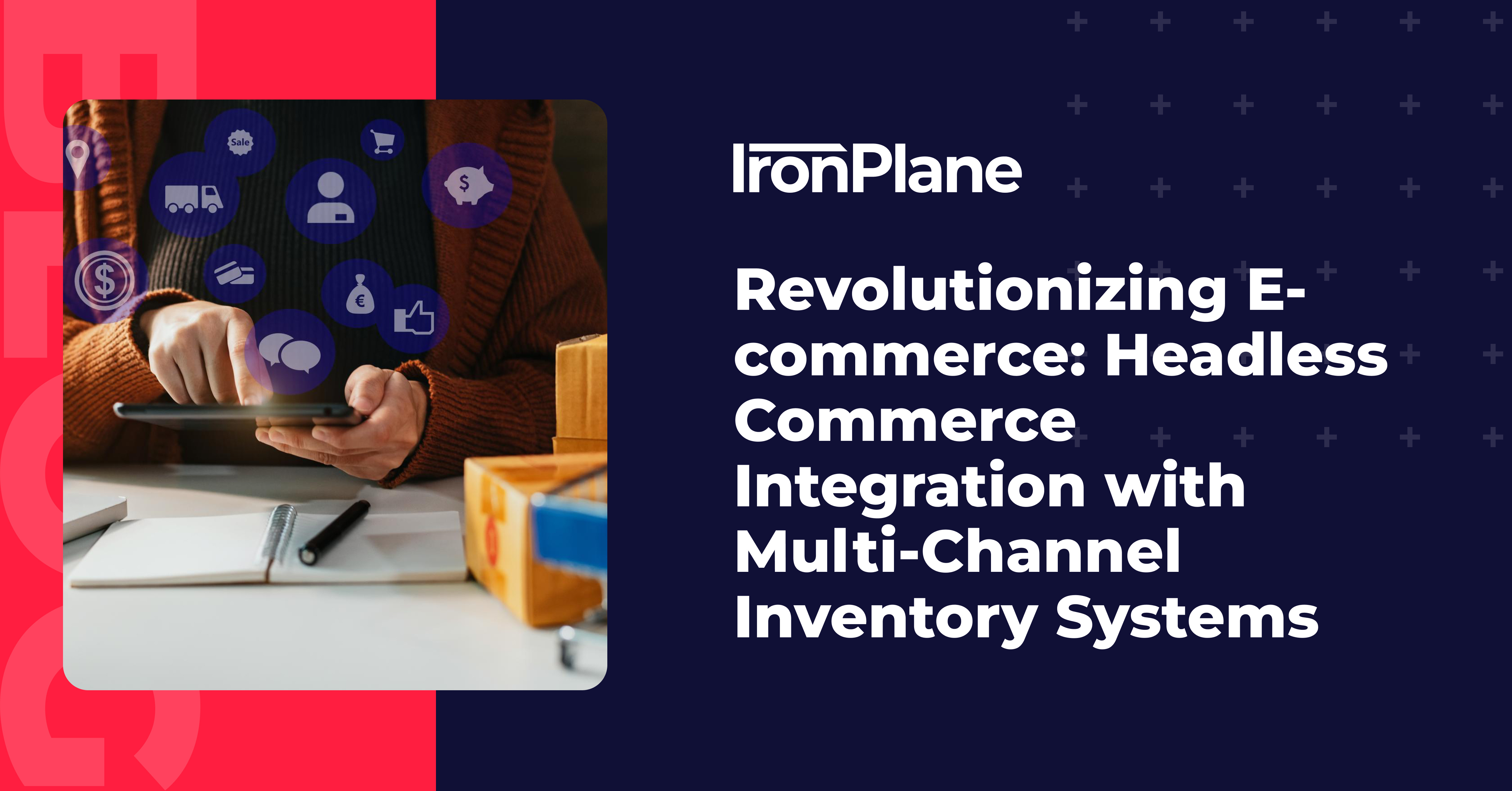What To Expect From an Adobe Commerce Consultation with IronPlane
Explore business-specific insights and best practices for an Adobe Commerce consultation from IronPlane.

In the dynamic world of e-commerce, choosing the right platform is a critical decision that can significantly impact your business's success. Two prominent contenders in the market are commercetools and Adobe Commerce (formerly Magento). While both platforms offer robust features and capabilities, they differ in their approach, architecture, and target audience. In this comprehensive article, we'll dive deep into the key differences between commercetools and Adobe Commerce, helping you make an informed decision based on your unique business needs.

Before we delve into the comparison, let's briefly introduce each platform:
commercetools is a modern, API-first, cloud-native e-commerce platform designed for flexibility and scalability. It follows a headless architecture, decoupling the frontend presentation layer from the backend commerce functionality. This approach allows businesses to create unique, customer-centric experiences across multiple channels and devices.
Adobe Commerce, built on Magento's foundation, is a comprehensive e-commerce solution that offers both flexibility and out-of-the-box functionality. It provides a robust set of features for managing online stores, including catalog management, order processing, and customer segmentation. Adobe Commerce is known for its extensibility and large community of developers and partners.

Let's now compare the two platforms across several essential aspects:
commercetools: With its headless architecture and API-first approach, commercetools offers unparalleled flexibility. It allows businesses to build custom frontends using any technology stack, enabling seamless integration with existing systems and facilitating omnichannel experiences.
Adobe Commerce: Adobe Commerce provides both traditional monolithic and headless architecture options. While it offers flexibility through its extensible architecture and API capabilities, it may require more development effort compared to commercetools' native headless approach.
commercetools: Built on a modern, cloud-native architecture, commercetools is designed to handle high-volume transactions and scale effortlessly. Its microservices-based architecture ensures optimal performance and allows for independent scaling of individual components.
Adobe Commerce: Adobe Commerce offers scalability options, including cloud deployment and performance optimization tools. However, scaling may require more manual intervention and infrastructure management compared to commercetools' inherent scalability.
commercetools: commercetools provides a strong foundation for B2B e-commerce, with features such as complex pricing, order approval workflows, and customer-specific catalogs. Its flexible architecture allows for seamless integration with ERP and CRM systems commonly used in B2B scenarios.
Adobe Commerce: Adobe Commerce offers a comprehensive set of B2B features out of the box, including quote management, customer-specific pricing, and B2B-specific payment methods. It also provides a native B2B module that caters to the unique requirements of B2B businesses.

commercetools: commercetools has a growing ecosystem of partners and developers, offering a range of integrations and extensions. However, its community is relatively smaller compared to Adobe Commerce, given its more recent entry into the market.
Adobe Commerce: Adobe Commerce benefits from a large and active community of developers, agencies, and partners. This extensive ecosystem provides a wealth of resources, extensions, and support options, making it easier to find solutions to common challenges.
commercetools: commercetools operates on a pay-as-you-go model, with pricing based on the usage of its API and services. This consumption-based pricing can be cost-effective for businesses with variable or seasonal demand. However, it's essential to consider the additional costs of building and maintaining a custom frontend.
Adobe Commerce: Adobe Commerce offers both on-premises and cloud-hosted deployment options, with pricing based on the chosen plan and features. While the upfront costs may be higher compared to commercetools, Adobe Commerce provides a more comprehensive set of out-of-the-box features, potentially reducing development and customization costs.

Deciding between commercetools and Adobe Commerce depends on various factors specific to your business, including:
To make an informed decision, it's essential to evaluate your business needs, growth plans, and technical capabilities. Consider engaging with an experienced e-commerce consultant who can guide you through the decision-making process and help you weigh the pros and cons of each platform in the context of your unique requirements.
At IronPlane, we understand that choosing the right e-commerce platform is a critical decision for your business. As a trusted Adobe Commerce development partner with extensive experience in e-commerce consulting, we are here to help you navigate the complexities of platform selection and implementation.

Our team of certified experts can provide you with:
Strategic Consulting: We'll work closely with you to understand your business objectives, assess your current systems, and recommend the most suitable e-commerce platform based on your unique needs.
Implementation and Customization: Once you've chosen your platform, our skilled developers will handle the implementation process, ensuring a smooth transition and customizing the platform to align with your brand and business requirements.
Integration and Extension Development: We specialize in integrating e-commerce platforms with existing systems, such as ERPs, CRMs, and PIMs. Our team can also develop custom extensions to extend the functionality of your chosen platform.
Ongoing Support and Optimization: Our partnership doesn't end at the launch of your e-commerce store. We provide ongoing technical support, performance optimization, and strategic guidance to help you continually improve and grow your online business.
Whether you're leaning towards commercetools, Adobe Commerce, or any other e-commerce platform, IronPlane is here to guide you every step of the way. Take the first step towards unlocking your e-commerce potential by requesting a consultation with our experts today. Together, we'll build a future-proof e-commerce solution that drives growth, enhances customer experiences, and sets your business up for long-term success.

Explore business-specific insights and best practices for an Adobe Commerce consultation from IronPlane.

In today's competitive e-commerce landscape, partnering with the right Adobe Commerce agency can make all the difference in your business's success.

In today's digital world, businesses are always looking for ways to stay ahead. One exciting development is combining headless commerce with multi-channel inventory systems. This powerful mix is changing how online stores work, giving them more flexibility, speed, and control over their websites and inventory.